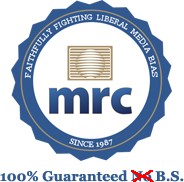The Media Research Center just hates it when conservative media bias is called out. And they’re really put out that the right-wing media’s attacks on Robert Mueller’s investigation into Trump-Russia links are being exposed for what they are.
In a Dec. 15 post, the MRC’s Curtis Houck responded to CNN’s Wolf Blitzer and “rabble rouser” Jim Acosta calling out those right-wing attacks by insisting that they’re just asking questions and aren’t trying to discredit the FBI at all:
What’s interesting was that the pair seemed to give zero thought to the possibility that this matter should be thoroughly examined in both the interest of transparency and the benefit of the investigation.
One prevailing thought in the media has been if the President has nothing to hide, then he should be more cooperative with the Special Counsel. Using that logic, the same should be expected of the FBI when it comes to snuffing out claims of political bias. Most reasonable people should and do believe that the FBI (and CIA) are among the country’s most cherished institutions. Simple questions don’t harm that credibility.
The other tidbit is how the media have defended the Mueller probe to the ends of the earth, but did the opposite with the Ken Starr investigation into the Clintons. My colleague Rich Noyes published a fascinating story that showcased the press’s viciousness roughly two decades ago when the subject of a special counsel investigation was a Democratic President.
And, indeed, Noyes did whine four days earlier:
In stark contrast to their supportive coverage of Mueller, the media’s treatment of Starr in the 1990s was savage. Almost as soon as he was named — and long before the Lewinsky story broke — Clinton-friendly journalists tried to discredit him as an unfair partisan.
[…]The media’s Starr-as-partisan mantra was merely the first step. At the same time Bill Clinton was running for re-election in 1996, Starr was putting his ex-business partners, James and Susan McDougal, on trial for fraud uncovered during the Whitewater investigation. Again, Clinton’s friends in the press raced to innoculate the President from the damaging scandal.
[…]It is, of course, impossible to imagine one of today’s journalists scolding Robert Mueller for distracting President Trump from important national business, or suggesting his investigation has become a partisan mission to destroy a President whom the Washington Establishment has never liked.
The double standard is obvious to anyone who will look.
That double standard is even more obvious at the MRC. Starr actually was the partisan the MRC insists Mueller is. As Joe Conason — who covered the many bogus Clinton “scandals” in the 1990s — explains, Starr “had served as solicitor general under President George H.W. Bush, who considered him for a Supreme Court nomination; he had raised funds for Republican candidates; he had served as a stalwart of the Federalist Society, the high-powered organization of right-wing Republican lawyers; and he had nearly run for the U.S. Senate in the 1994 Virginia Republican primary.” He also provided legal advice to a conservative women’s group in support of the Paula Jones lawsuit against Clinton. Starr was placed as independent counsel by Republican-appointed judges apparently upset that the original counsel, Robert Fiske, was going to clear Clinton in the Whitewater alleged scandal, Conason adds.
Needless to say, neither Houck nor Noyes mentioned that fears about Starr’s partisan affiliations — none of which, by the way, can be found with Mueller — were well-founded. Neither did the MRC’s Tim Graham and Brent Bozell, who whined in their Dec. 13 column that “among the 15 Mueller lawyers, nine are Democratic donors — several of whom contributed to Clinton’s 2016 campaign” and complained that “Back then, anti-Kenneth Starr commentary wasn’t ‘shocking.’ It was mandatory.”
Just as it is currently mandatory for MRC writers to issue anti-Mueller commentary.
